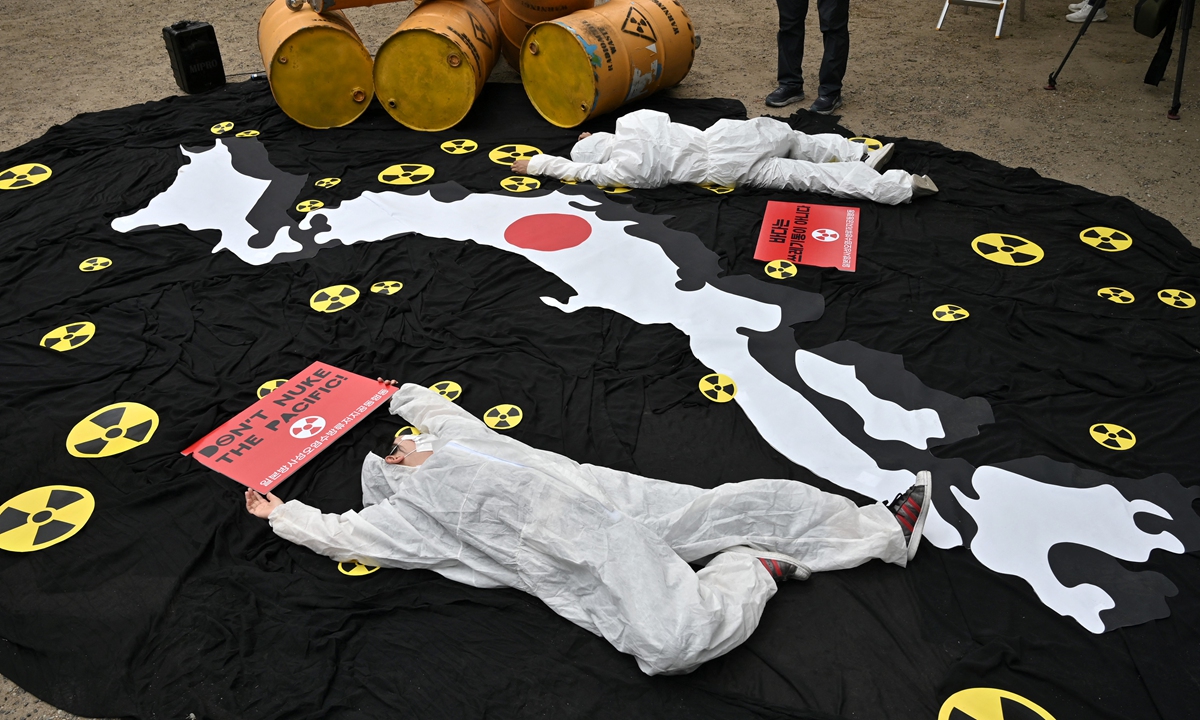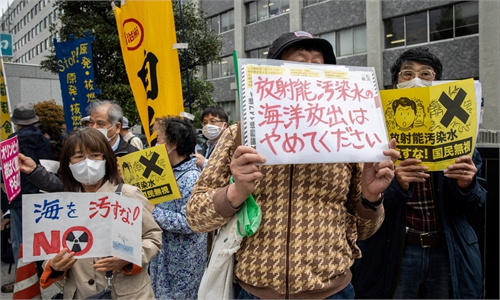Japan approves nuclear-contaminated water discharge plan, may turn Japanese people into ‘sick men of Asia,’ seafood consumption and export nosedive

Tanks (in gray, beige and blue) storeing water that was treated but is still radioactive after it was used to cool down spent fuel at the Fukushima Daiichi nuclear power plant in Okuma town, Fukushima prefecture, northeastern Japan, on Feb. 27, 2021. Photo: VCG
Japan's nuclear regulator on Friday approved the discharge plan of Fukushima nuclear-contaminated water, with Chinese observers voicing concerns that the release of the contaminated water into the ocean may start earlier than the previous schedule of next spring and warning that Japan will bear the brunt of damage, with people's lives under serious threat and seafood consumption and export nosediving.
The Nuclear Regulation Authority of Japan on Friday officially approved Tokyo Electric Power Company Holdings (TEPCO)'s implementation plan of discharging treated Fukushima nuclear accident contaminated water, according to the Japanese Foreign Ministry.
Although the Foreign Ministry statement said this does not mean that TEPCO can immediately start the discharge of the contaminated water into the sea as there are remaining processes, such as the Japanese regulator's inspections to check and confirm the installation status of the discharge facilities, Chinese observers believed that Japan may accelerate its scheduled plan, making the release start earlier than April 2023.
Chang Yen-chiang, director of the Yellow Sea and Bohai Sea Research Institute of Dalian Maritime University, who has been closely following the Japanese government's decision on discharging Fukushima wastewater, told the Global Times on Friday that the administrative process for releasing the contaminated water was done in a really fast manner, as it only took Japan five days from announcing completion of construction for undersea tunnel outlet to approving the plan.
The TEPCO has basically completed the construction of an undersea tunnel outlet to dump the nuclear-contaminated water, the Kyodo News agency reported on Sunday.
"I'm more worried that Japan will accelerate its release process. It looks like everything basically has been done, and the next step could be discharging directly. It's very likely that the release will come earlier than April 2023," Chang said.

South Korean environmental activists perform during a protest in Seoul, South Korea against Japan’s plan to discharge Fukushima radioactive water into the sea, as they mark World Oceans Day on June 8, 2022. Photo: AFP
Japan's latest move apparently aroused lots of concern and opposition from neighboring countries.
Chinese Foreign Ministry spokesperson Wang Wenbin said at Friday's media briefing that it is extremely irresponsible for Japan to attempt to create a fait accompli, regardless of various parties' concerns and China firmly opposes it.
China once again urges Japan to earnestly fulfill its due international obligations, dispose of the nuclear-contaminated water in a scientific, open, transparent and safe manner, and stop pushing through the ocean discharge plan, Wang said.
If Japan persists in putting its own self-interest above the international public interest and takes a dangerous step, it will surely pay the price for its irresponsible behavior and leave a blot in history, Wang said.
The South Korean government on Friday also expressed concern over the Japanese nuclear regulator's official approval of the discharge plan, the Yonhap News agency reported.
Seoul also said that it would strengthen cooperation with the International Atomic Energy Agency, and strengthen domestic marine radiation monitoring and communication with the public.
Analysts said that if the contaminated water was released into the sea, it's Japan that could be hit the hardest, given that Japan is one of the world's largest countries in terms of seafood consumption, and nuclear-contaminated seafood may result in severe health risks for local people.
The Japanese people are likely to suffer the most, as the number of people in coastal areas who are likely to suffer from radiation-related diseases such as leukemia, cancer and infertility is expected to increase significantly, seriously affecting Japan's social stability and economic development, Yu Zhirong, a research fellow at Ningbo University's East China Sea Institute, told the Global Times on Friday.
"Japanese people are likely to become the 'sick men of Asia' in the 21st century. This is not a joke, but an indisputable fact," he said.
Meanwhile, Japan's seafood exports will be greatly hindered, which would hurt the economy and local fishery groups, observers said.
Many countries, including the US and UK, banned imports of food products manufactured in and around Fukushima Prefecture following the 2011 nuclear disaster, and some countries and regions have not lifted the ban even now.
Fishery groups in Japan have repeatedly said they were firmly opposed to the plan due to concerns over a negative impact on the industry.
The approval showed that the wrong decision made by Yoshihide Suga's cabinet last year was not denied or overturned by the Fumio Kishida administration. Instead, the current Japanese government went ahead, regardless of strong opposition at home and abroad, and Japan's move is bound to push Japan and even the Asia-Pacific region into a dangerous abyss, Yu said.
Chang said countries including Russia, Canada, the US, some Pacific island nations and the Philippines will be affected through the flow of ocean currents after Japan releases the water into the sea.
Observers have called for urgent international cooperation to stop Japan from releasing the contaminated water into the sea.
Chang said that some South Korean research institutions have contacted him for seminars and speeches, indicating that South Korea is trying to cooperate with China on the issue.
China and other stakeholders could through the UN request an advisory opinion from the International Court of Justice, to prove the release is illegal, Chang said.
Yu also advised countries to conduct maritime environment investigation, which could be evidence in seeking compensation from Japan in cases of biological resources damages and other damages.


